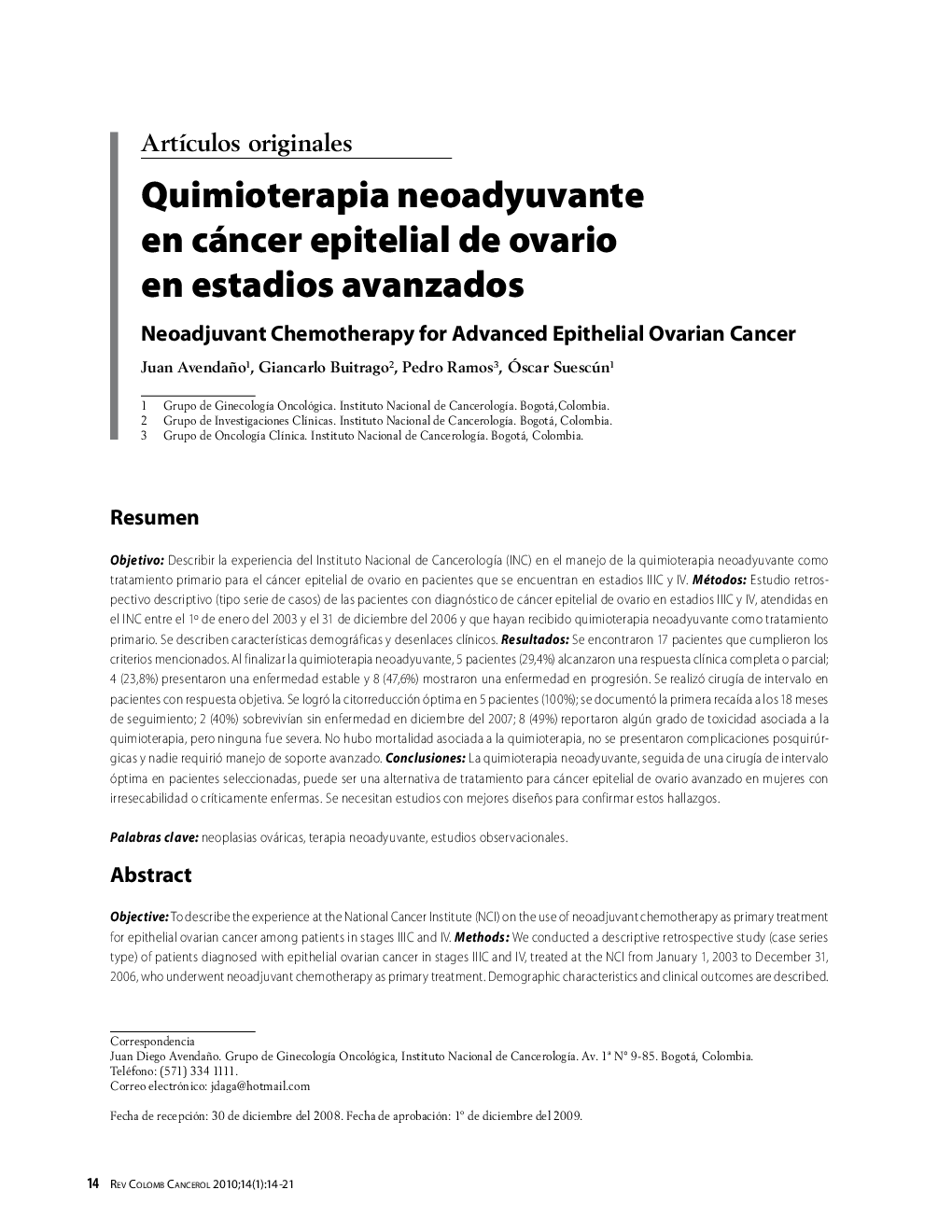| Article ID | Journal | Published Year | Pages | File Type |
|---|---|---|---|---|
| 3997362 | Revista Colombiana de Cancerología | 2010 | 8 Pages |
ResumenObjetivoDescribir la experiencia del Instituto Nacional de CancerologÃa (INC) en el manejo de la quimioterapia neoadyuvante como tratamiento primario para el cáncer epitelial de ovario en pacientes que se encuentran en estadios IIIC y IV.MétodosEstudio retrospectivo descriptivo (tipo serie de casos) de las pacientes con diagnóstico de cáncer epitelial de ovario en estadios IIIC y IV, atendidas en el INC entre el 1° de enero del 2003 y el 31 de diciembre del 2006 y que hayan recibido quimioterapia neoadyuvante como tratamiento primario. Se describen caracterÃsticas demográficas y desenlaces clÃnicos.ResultadosSe encontraron 17 pacientes que cumplieron los criterios mencionados. Al finalizar la quimioterapia neoadyuvante, 5 pacientes (29,4%) alcanzaron una respuesta clÃnica completa o parcial; 4 (23,8%) presentaron una enfermedad estable y 8 (47,6%) mostraron una enfermedad en progresión. Se realizó cirugÃa de intervalo en pacientes con respuesta objetiva. Se logró la citorreducción óptima en 5 pacientes (100%); se documentó la primera recaÃdan a los 18 meses de seguimiento; 2 (40%) sobrevivÃan sin enfermedad en diciembre del 2007; 8 (49%) reportaron algún grado de toxicidad asociada a la quimioterapia, pero ninguna fue severa. No hubo mortalidad asociada a la quimioterapia, no se presentaron complicaciones posquirúrgicas y nadie requirió manejo de soporte avanzado.ConclusionesLa quimioterapia neoadyuvante, seguida de una cirugÃa de intervalo óptima en pacientes seleccionadas, puede ser una alternativa de tratamiento para cáncer epitelial de ovario avanzado en mujeres con irresecabilidad o crÃticamente enfermas. Se necesitan estudios con mejores diseños para confirmar estos hallazgos.
ObjectiveTo describe the experience at the National Cancer Institute (NCI) on the use of neoadjuvant chemotherapy as primary treatment for epithelial ovarian cancer among patients in stages IIIC and IV.MethodsWe conducted a descriptive retrospective study (case series type) of patients diagnosed with epithelial ovarian cancer in stages IIIC and IV, treated at the NCI from January 1, 2003 to December 31, 2006, who underwent neoadjuvant chemotherapy as primary treatment. Demographic characteristics and clinical outcomes are described.ResultsSeventeen patients who fulfilled the abovementioned criteria were selected. Once neoadjuvant chemotherapy ended, 5 patients (29.4%) achieved complete or partial clinical response; 4 (23.8%) remained in stable condition, and 8 (47.6%) showed signs of progressive illness. Interval debulking surgery was performed on objective response patients. Maximum cytoreduction was achieved in 5 patients (100%); first relapse was reported at month 18 of follow-up; 2 disease-free survivors were identified in December, 2007; 8 (49%) reported some degree of non-severe chemotherapy-related toxicity. No mortality was related to chemotherapy, no postsurgical complications were observed and no patient required advanced support management.ConclusionsNeoadjuvant chemotherapy, followed by optimal interval debulking surgery among selected patients, can be an alternative treatment for advanced epithelial ovarian cancer among women with irresecability or the critically ill. Further studies with improved design are required to confirm these findings.
